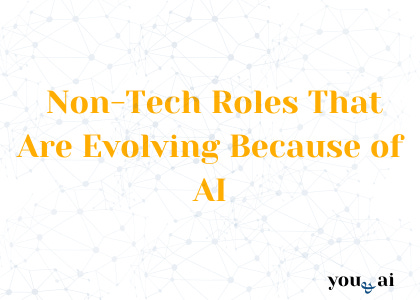5 Non-Tech Roles That Are Evolving Because of AI
Artificial Intelligence (AI) is often associated with engineers, data scientists, and tech startups. But the truth is, AI isn’t just for coders anymore.
Artificial Intelligence (AI) is often associated with engineers, data scientists, and tech startups. But the truth is, AI isn’t just for coders anymore.
From marketing to HR, AI is transforming how everyday professionals work. As tools get smarter, non-tech roles are evolving in real-time, shifting responsibilities, boosting productivity, and changing skill requirements.
Here are five non-technical roles that AI is reshaping and what you need to know to stay ahead.
1. Marketing Professionals: AI-Enhanced Storytellers
AI is no longer just optimising ads, it’s helping craft them.
Marketing professionals now rely on tools like ChatGPT, Jasper, and Midjourney for content creation, ideation, A/B testing, and design generation. AI can write copy, analyse audience behaviour, and predict campaign performance with surprising accuracy.
What’s changing?
Greater focus on strategy and brand positioning
Less time spent writing or designing from scratch
Need to learn prompt engineering and AI tool usage
Pro tip: Get comfortable with creative AI tools. Knowing how to guide AI will be more important than writing every line yourself.
2. Customer Service Agents: AI-Augmented Problem Solvers
AI chatbots now handle basic queries, FAQs, and transactional issues. This frees up human agents to handle complex, emotional, or nuanced concerns.
But AI doesn’t replace empathy; it enhances it. Modern agents work alongside AI, using it to retrieve customer data, suggest solutions, and even predict problems before they arise.
What’s changing?
Shift from reactive to proactive support
Emphasis on soft skills like empathy and conflict resolution
Integration with AI-powered CRMs and chat systems
Pro tip: Train in emotional intelligence and get familiar with tools like Zendesk AI or Intercom.
3. Administrative Assistants: AI Workflow Designers
From scheduling meetings to drafting emails, many tasks handled by administrative professionals can now be automated with AI.
Rather than becoming outdated, assistants are now AI workflow designers, curating which tools to use, automating tasks, and managing smarter calendars and communication systems.
What’s changing?
Less manual scheduling, more process optimisation
Use of AI tools like Reclaim.ai, Notion AI, or x.ai
More strategic support and decision-making tasks
Pro tip: Learn to build automations using tools like Zapier or Notion with AI plugins
4. HR Professionals: Talent Experience Architects
Hiring, onboarding, and employee engagement are now powered by data-driven insights. AI can screen resumes, assess personality fit, and even forecast employee turnover.
This shifts HR into a more strategic role, designing inclusive, engaging, and growth-oriented experiences for talent that leverage AI insights.
What’s changing?
Emphasis on ethical AI and bias mitigation
Use of AI for talent analytics and predictive hiring
Blending human warmth with data-driven decision-making
Pro tip: Explore AI-enabled platforms like Pymetrics or HireVue, but always balance data with human judgment.
5. Teachers & Educators: AI-Guided Learning Designers
Education is going through a quiet revolution. AI can now personalise learning paths, assess student progress in real-time, and provide targeted tutoring support.
This doesn’t replace educators; it frees them to focus more on mentorship, critical thinking, and designing more inclusive learning experiences.
What’s changing?
Shift from “sage on the stage” to “guide on the side”
Use of AI in curriculum design and learning management systems
Higher demand for adaptability and digital fluency
Pro tip: Try tools like Khanmigo (by Khan Academy) or Google’s AI in education suite to stay ahead.
Final Thoughts
AI isn't just reshaping tech jobs, it's reimagining every job.
Whether you're in customer service, education, or HR, the key is not to fear AI but to understand how to work with it. Upskilling, learning to use AI tools, and focusing on human strengths like creativity, empathy, and strategy will help you thrive in this new era.
You don’t have to be a coder to benefit from AI; you just have to be curious, adaptable, and open to learning.

